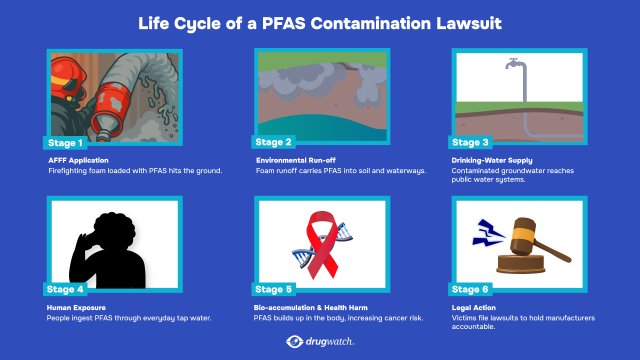Aqueous Film-Forming Foam (AFFF) Lawsuit
Lawsuits are being filed over claims that AFFF is linked to the development of health conditions like cancer. AFFF, which is used to fight fires, contains harmful chemicals that don’t easily break down in the environment. These chemicals have contaminated water supplies nationwide.
Our content is developed and backed by respected legal, medical and scientific experts. More than 30 contributors, including product liability attorneys and board-certified physicians, have reviewed our website to ensure it’s medically sound and legally accurate.
legal help when you need it most.
Drugwatch has provided people injured by harmful drugs and devices with reliable answers and experienced legal help since 2009. Brought to you by The Wilson Firm LLP, we've pursued justice for more than 20,000 families and secured $324 million in settlements and verdicts against negligent manufacturers.
More than 30 contributors, including mass tort attorneys and board-certified doctors, have reviewed our website and added their unique perspectives to ensure you get the most updated and highest quality information.
Drugwatch.com is AACI-certified as a trusted medical content website and is produced by lawyers, a patient advocate and award-winning journalists whose affiliations include the American Bar Association and the American Medical Writers Association.
About Drugwatch.com
- 15+ Years of Advocacy
- $324 Million Recovered for Clients
- 20,000 Families Helped
- A+ BBB Rating
- 4.9 Stars from Google Reviews
Testimonials
I found Drugwatch to be very helpful with finding the right lawyers. We had the opportunity to share our story as well, so that more people can be aware of NEC. We are forever grateful for them.
- Legally reviewed by Brian Ranger Wilson, Esquire
- Last update: January 5, 2026
- Est. Read Time: 8 min read
- MDL 2873: As of February 2026, there were 15,216 claims pending in South Carolina federal court, according to the U.S. Judicial Panel on Multidistrict Litigation.
- Trial Schedule: A bellwether trial was scheduled for October 2025, but it has been taken off the calendar.
- Who Can File: Firefighters, military service members and others who developed cancer after being exposed to AFFF or drinking AFFF-contaminated water.
- Main Allegations: PFAS chemicals that are used in firefighting foams are connected to the development of serious health conditions like kidney cancer and testicular cancer.
- Previous Settlements: In recent years, several major PFAS manufacturers settled water contamination lawsuits filed by states, municipalities and public water utilities, including multi-billion dollar settlements from 3M and DuPont.
What Is the AFFF Cancer Lawsuit About?
Thousands of AFFF lawsuits have been filed in recent years over claims that exposure to the PFAS in the foam may lead to serious health conditions.
Lawsuits have been filed by firefighters, first responders and others who worked around this foam and were directly exposed to it. Exposure often occurred at airports, military bases and firefighting training facilities.
Other cases have been filed by people who may have been impacted via drinking water. Following decades of use, AFFF and its potentially cancer-causing chemicals have contaminated drinking water supplies across the nation.
Many people who drank contaminated water and developed serious health issues have filed lawsuits. Some public water systems have even sued over contamination, with a few plaintiffs receiving billions of dollars in settlements.
Firefighters have also filed turnout gear lawsuits over claims that the chemicals in firefighting foam were used in protective gear.
On Dec. 7, 2018, a federal panel combined 75 of these lawsuits into a multidistrict litigation (MDL). MDLs allow several similar cases to be combined in a single court to speed up the legal process. The AFFF multidistrict litigation (MDL No. 2873) is centralized in South Carolina. It includes claims of cancer and other illnesses linked to toxic AFFF and other PFAS exposure. The lawsuits include 15,216 active lawsuits.

Aqueous film-forming foam (AFFF) is a type of foam that is used to fight fires. For decades, it was used at airports, firefighting training facilities and military bases due to its effectiveness in combating liquid-based fires, including those caused by gasoline.
The Department of Defense began requiring its installations to stop using AFFF as of October 1, 2024, due to the presence of hazardous chemicals in the foam.
AFFF contains per- and polyfluoroalkyl substances (PFAS), which are also known as forever chemicals. These chemicals have useful properties, like water resistance. However, they are man-made, nearly indestructible and can linger in the environment.
Research has emerged that PFAS may increase the risk of serious health issues, including kidney, testicular and thyroid cancer.
Who Qualifies for the AFFF Lawsuit?
If you were exposed to AFFF or drank water contaminated by this foam and developed a serious health condition, you might qualify to file an AFFF lawsuit.
- Kidney Cancer
- Liver Cancer
- Testicular Cancer
- Thyroid Cancer
- Thyroid Disease
- Ulcerative Colitis
For your lawsuit to be successful, you should be able to document where and how your AFFF exposure occurred.
AFFF Lawsuit Eligibility Checklist
- Proof of AFFF firefighting foam exposure
- Employment or military records and residency details
- Proof of duration, timing and location of exposure
- Kidney cancer
- Liver cancer
- Testicular cancer
- Thyroid cancer
- Ulcerative colitis
- Minimum 2 years between first exposure and cancer or thyroid disease diagnosis
- Minimum 6 months between first exposure and ulcerative colitis diagnosis
Military or employment records and training logs can document your exposure and time spent working with AFFF. You will need a doctor’s diagnosis and copies of testing that confirmed your diagnosis.
Your family may also qualify for an AFFF lawsuit due to secondary exposure to contaminated water, particularly if they lived in an area with drinking water contaminated with AFFF.
Don’t worry if you aren’t sure how to figure this out on your own. We can connect you with experienced mass tort law firms to help you gather the necessary information to build the strongest case possible.
Firefighters
Given its uses, AFFF is often employed by firefighters, making them one of the groups most susceptible to exposure.
This means that many firefighters could qualify for lawsuits if they worked around this foam and went on to develop a serious health condition.
Firefighters may also be exposed in multiple ways. While many people are exposed to PFAS contamination through drinking water that AFFF and its chemicals have seeped into, firefighters may be directly exposed through skin contact.
Water contamination can also still be a concern since this foam may seep into the ground around fire stations.
Military & DoD Personnel
Military personnel are another group who may qualify for lawsuits due to AFFF exposure. This firefighting foam was used at military bases and installations for decades and can still be present there today.
In August 2024, more than 1,000 gallons of AFFF were accidentally discharged at a former military base in Maine, leading to the foam spreading outside of the base and chunks of it being carried away by the wind.
Even at military bases where a serious fire never took place, AFFF was often discharged through practices, tests and training exercises.
Government contractors may also be eligible to file an AFFF lawsuit. They would typically be prevented from doing so because of the “government contractor defense.” This legal maneuver helps companies that sell products to the U.S. government avoid liability if they follow government specifications and report known dangers.
However, in September 2022, the federal judge in the AFFF MDL ruled against 3M’s efforts to invoke the rule. This decision allowed military personnel and government contractors to move forward with their lawsuits against 3M and certain other manufacturers.
What Cancers and Illnesses Are Linked to AFFF Exposure?
Research has linked the chemicals contained in firefighting foam to a growing list of potential health problems, including kidney cancer, testicular cancer, cholesterol issues and more. These PFAS health effects can be wide-ranging and devastating.
One type of PFAS in AFFF is called perfluorooctanoic acid (PFOA). The International Agency for Research on Cancer classifies this chemical as carcinogenic to humans. While PFOA is no longer manufactured in the United States, its potential health consequences remain following years of use.
According to the American Cancer Society, studies have suggested links between PFOA exposure and higher risks of several cancers.
- Kidney Cancer
- A 2021 study in the Journal of the National Cancer Institute found that people with higher PFOA blood levels had an increased risk of kidney cancer (renal cell carcinoma), even at exposure levels seen in the general population.
- Testicular Cancer
- A 2023 study in Environmental Health Perspectives found that Air Force service members with higher PFOS blood levels faced a greater risk of testicular cancer, especially those who served as firefighters or on bases with PFAS-contaminated water.
- Breast Cancer
- A 2023 study in the International Journal of Cancer discovered that higher levels of two specific chemicals in AFFF — PFOS and PFOA — could raise the risk of developing breast cancer after menopause. This seems especially true for certain types of breast cancer that are influenced by hormones.
- Thyroid Cancer
- A 2023 study from the Icahn School of Medicine at Mount Sinai has found that higher levels of a chemical called PFOS in the blood are associated with a 56% increased risk of developing thyroid cancer, particularly the most common type known as papillary thyroid cancer. This suggests that these chemicals, known as PFAS, could be playing a role in the increasing rates of thyroid cancer.
Some studies about people who lived near or worked on chemical plants tied to PFOA have also uncovered evidence of increased risks of kidney and testicular cancers. One study published in 2013, for example, examined adults living near a chemical plant and found that PFOA exposure in that community was tied to both types of cancer.
PFAS exposure symptoms may also include adverse effects on your immune system, increases in cholesterol and more.
Who Is Being Sued in the AFFF Lawsuit?
The companies that manufactured and sold firefighting foams, as well as the potentially harmful chemicals they contain, are being sued in PFAS lawsuits. One of the main defendants is 3M. The company produced and sold firefighting foam from the 1960s to the early 2000s.
Reports allege that 3M was aware of the risks associated with its firefighting foam for decades, despite claiming otherwise publicly. As late as the 1990s, the company said its foam could be discharged directly into sewers.
Hundreds of military sites are suspected of having discharged AFFF over the years.
Key defendants also include DuPont and its spinoff company, Chemours. Other notable defendants who have been sued in AFFF lawsuits include:
- 3M Co.
- AGC Chemicals Americas
- Arkema Inc.
- BASF Corp.
- Buckeye Fire Equipment Co.
- Carrier Global Corp.
- ChemDesign Products Inc.
- Chemguard Inc.
- Chemours Co.
- Clariant Corp.
- Corteva Inc.
- DuPont de Nemours Inc.
- Dynax Corp.
- Kidde-Fenwal Inc.
- Kidde Inc.
- National Foam Inc.
- Tyco Fire Products LP
- United Technologies Corp.
Is There a Settlement in the AFFF Lawsuit Yet?
There has yet to be a global settlement for the AFFF personal injury lawsuits, but one could come in the near future.
Currently, there are 15,216active AFFF lawsuits consolidated in federal court in multidistrict litigation (MDL). MDLs are used to streamline the legal process when many similar lawsuits are filed, placing them all before one judge.
Settlements worth billions of dollars have already been agreed to for public water systems that brought lawsuits. Now, the MDL is focused in on personal injury cases. However, these settlements cover the costs of cleanup and remediation of water supplies and systems. They do not provide compensation for people injured by AFFF or PFAS contamination. If you were injured by these exposures, you will have to file an individual AFFF lawsuit.
A global settlement could resolve thousands of lawsuits and bring relief to people who say they were impacted by these serious issues.
When Will the AFFF Lawsuit be Settled?
The AFFF lawsuits may be settled within the next few months. In June 2025, the judge overseeing these cases encouraged both sides to reach a settlement before the first bellwether trial begins in October.
Bellwether trials are part of the MDL process and work like test cases. Instead of having all of the cases go to trial, a small handful are chosen for bellwether trials. The outcome of these trials helps both sides understand the strength of their arguments and what might happen if more cases go before a jury.
When people who filed lawsuits win bellwether trials, defendants are often motivated to agree to a global settlement instead of risking sending more cases to trial, where they may have to make larger payouts.
The first AFFF personal injury bellwether trial will focus on kidney cancer.
How Much Could AFFF Lawsuit Victims Receive?
Industry estimates suggest that individual AFFF settlement payouts may range from $75,000 to $500,000. However, these estimates are speculative, and a settlement is not guaranteed.
Payouts will depend on the extent of your injury and the individual details of your case. A kidney cancer case, for example, may be eligible for a different payout than a testicular cancer case.
The parties in the AFFF litigation have not yet agreed to a global settlement. Individual cases that go to trial could potentially earn much more if they receive a favorable verdict.
Individual payouts from MDLs vary from person to person. The amount you may receive can be affected by age, lost wages, jurisdiction and the severity of your injuries. These may be measured on a multi-tiered scale.
Example of Compensation for Injuries in an MDL Settlement
| Tier | Injuries |
|---|---|
| Top-tier payouts | These include the most severe injuries and the youngest ages (which account for more lost wages). This may consist of severe cancers requiring long-term treatment or deaths. |
| Mid-tier payouts | These include lesser cancer injuries and other injuries that do not require longer-term treatment or death. |
| Lower-tier payouts | These typically include lesser injuries, including property damage or lost wages. |
Expert Perspectives on AFFF Lawsuits
AFFF Lawsuit FAQs
Calling this number connects you with a Drugwatch.com representative. We will direct you to one of our trusted legal partners for a free case review.
Drugwatch.com's trusted legal partners support the organization's mission to keep people safe from dangerous drugs and medical devices. For more information, visit our partners page.









